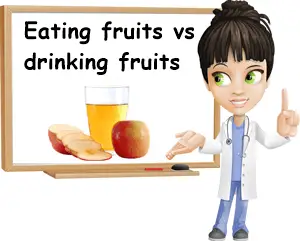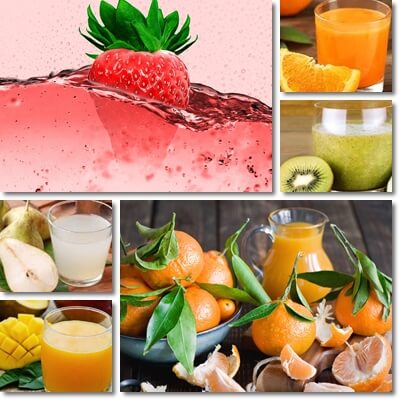Everybody knows that eating whole fruits is good for you and as a result, many people assume that drinking fruit juices is just as good or even better for you. But in today’s economic and agricultural context, deciding which is healthier, eating whole fruits or drinking fruit juices should take into account various factors such as nutritional value of fruits vs fruit juices, nutritional requirements of the individual and existing medical conditions that could restrict one dietary choice or the other. And above all, origin, quality, processing and amount of either whole fruits or fruits juices you eat or drink.
What is better: eating whole fruits or drinking fruit juices? You can only make this decision after you consider the following concerns: fruits and fruit juices quality, origin and nutritional content. Ideally, both the whole fruits and juice should be grown organically or come from organic agriculture, free of pesticides, preferably grown locally and seasonal in the first case and least processed, with no preservatives or at least natural preservatives in the second case. This set of conditions alone limits our choice of healthy fruits and fruit juices considerably.

The reason why it’s important to get fruits and fruit juices from organic agriculture is because special attention is paid to how the fruits grow: they are given soil conditions as close to their requirements as possible, pests are dealt with naturally and any losses are accounted for via other marketing strategies (the best looking fruits are sold for consumption as whole fruits, while the least best looking ones may be made into juice, pastes, marmalade, jams or other products). More important, they are more likely to have a better nutritional value because, as you know, not all plant foods have the same nutritional value and soil requirements are a deciding factor.
Fruits grown locally are also usually better because, irrespective if you eat them whole or drink juice made from them, they are more likely to maintain most of their nutritional value as the journey from the tree or shrub to your table is shorter. This reduces nutritional losses as a result of overripeness in the case of some fruits or as a result of being underripe in the case of others. For example, overripeness of some fruits causes them to lose important nutrients like vitamin C.
Not to mention you can visit your local apple orchard and see what’s actually going on there and honest farmers and producers who strive to give you produce of excellent quality will surely be happy to show you how hard they work and consolidate your confidence in their work ethics and produce quality. Whereas going to other countries to check how produce you usually eat are grown and treated entails certain costs and is an unrealistic effort. Even more, agricultural regulations in your country are usually different from those of other countries, which means an exotic fruit you may love might be treated with an unregulated pesticide or one that is forbidden in your country because of the health risks it presupposes.

Now, if both the whole fruits and fruit juices you are eating or drinking are safe and healthy, here is all you need to know when deciding which is better for you, eating whole fruits or drinking fruit juices:
1) Whole fruits have fiber
Juices contain only the fruit juice and vitamins and minerals that are soluble and usually none of the pulp or edible fruit skin. But fiber is healthy and good for you because it satiates, helping you feel full faster and longer, with benefits for weight loss. It is good for digestion and feeds the good gut bacteria, not to mention it helps relieve constipation naturally and is good for hemorrhoids. Learn more about what foods to eat and to avoid for hemorrhoids.
2) Fruit juices are rich in sugar, albeit natural
A bottle of fruit juice you may drink in one day contains more fruit than you would probably eat in two days. And that juices also contains all the sugar in those fruits, albeit natural forms of sugar. But don’t let this fool you: while refined sugar is definitely the worst, eating excessive amounts of any form of sugar from any food source is very likely bad for you health. This is why fruit juices are bad for diabetics and anyone with a pre-diabetic condition (high blood sugar). Some even contain added sugars to make them taste sweeter, so read the label carefully to get as natural a product as you can.
3) Fruit juices are worse for diabetics
Considering fruit juices provide several times the amount of sugars than the whole fruit and more calories, they are bad for diabetics or anyone with high blood sugar levels. However, this does not mean you can eat all the fruit you want as long as you avoid juices. Diabetics still need to avoid foods that make their blood sugar levels raise suddenly. But eating moderate amounts of produce provides important amounts of fiber which helps manage weight, for example, providing long-term benefits for diabetes. In healthy people, eating whole fruits can reduce the risk of type 2 diabetes by at least 25%.
4) Whole fruits are often as hydrating as fruit juices
Just because fruit juices are all liquid, that doesn’t mean they hydrate better than fruits. A lot of fruits (and vegetables) are over 85% water and contribute towards hydrating the body (example: watermelon). Fruit juices are rich in sugar which actually dehydrates, making them less of a better choice overall for keeping hydrated (also see the best foods to eat in a heatwave to stay hydrated).
5) Fruit juices often contain preservatives
Although this is not true for all fruit juices, a lot of them contain preservatives that take away from their healthy properties. Some are not even made from real fruit juice or contain very little of it (less than 6%, the rest being water and flavors) and are definitely not the best choice. If you do want a healthy fruit juice, you can either choose a good brand or make it yourself at home from scratch, from whole fruits (it doesn’t get healthier than that).
6) Whole fruits maintain their vitamins and minerals content better
Vitamins, minerals and antioxidants in fruit are enclosed in pulp, some in the pith (the white, spongy albedo of citrus fruit) or edible skin, protected by either the skin or rind. Once they are released by juicing, they are immediately exposed to air, temperature variations, heat processing or other factors that cause the nutrients to deteriorate.
7) The majority of fruit juices are pasteurized
Unpasteurized fruit juices carry risks of bacterial infection or intestinal parasites infections, which are most dangerous for children, the elderly or anyone with a weak immune system. This has lead to health organizations enforcing pasteurization and fruit juice producers complying to avoid any unnecessary risks. But pasteurization also causes massive losses of vitamins and sometimes minerals. Following pasteurization, some juices are fortified with vitamins and minerals, but rarely do they contain all the naturally-occurring nutrients in the whole fruit.
8) The nutrients in fruit juices are more bioavailable
Indeed, research shows that juicing makes vitamins and minerals easier to absorb as well as increases their absorption rate. This is especially true for cold pressed or freshly-made fruit juices that are not subjected to pasteurization and preserve most of their initial nutritional value. Whole fruits have fiber which can reduce the absorption of nutrients to a certain extent. Learn more about the properties and benefits of dietary fiber.
Conclusion
Eating healthy, whether it’s about whole fruits or fruit juices doesn’t mean you have to give up bananas or persimmons, durian, oranges or lychee, or the quality fruit juices made from them. It just means that overall it is important to make as many healthy dietary choices on a daily basis as possible to build up your health in the long run. And this may sometimes mean eating the orange instead of drinking the juice, making your own orange juice from scratch if you can’t find a quality one made from real orange juice out there, eating locally grown organic fruit most of the time or, if you prefer exotic fruits, making sure they have organic certifications, even though this makes them pricier. The idea is to know what is in your food, make informed decisions and simply find your balance.
